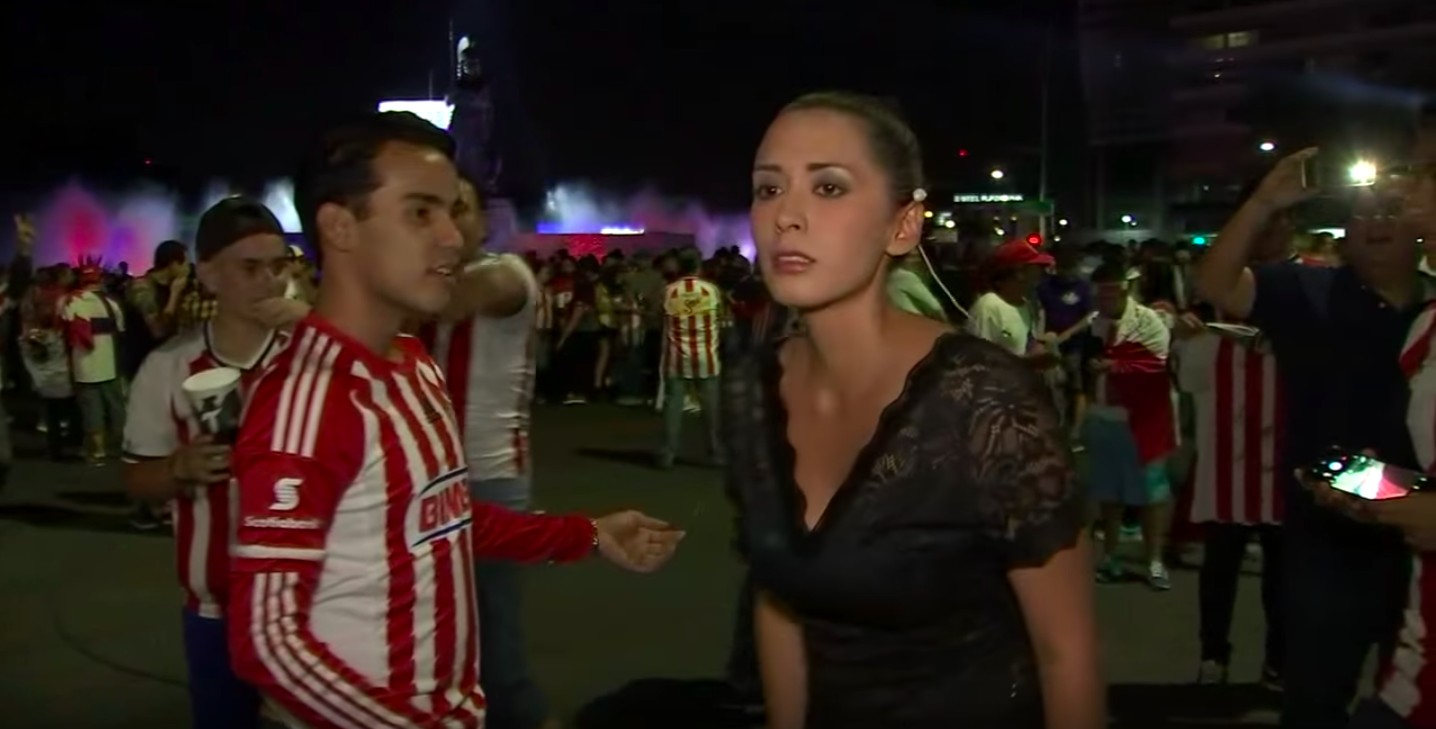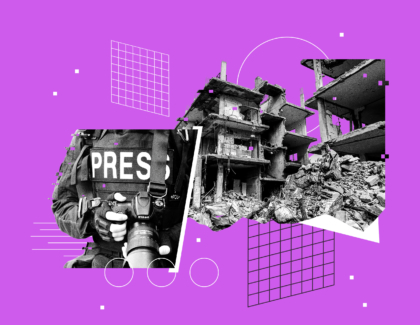Sign up for the daily CJR newsletter.
As Julieth González Therán reported live from the World Cup in Russia last month, a man ran up and kissed the Colombian broadcaster on her cheek. The intrepid reporter continued her segment for an additional four minutes as though nothing had happened. Therán was not the only female journalist to be sexually assaulted on camera while broadcasting from the World Cup; at least two others had similar experiences.
In the aftermath, Deutsche Welle, the broadcasting company Therán works for, released a statement on Twitter from DW’s editor-in-chief condemning sexual assault and harassment in football, and elsewhere:
A DW reporter was sexually harassed while covering the #WorldCup. @JULIETHCGT was kissed, groped by a man while reporting from Moscow.
The incident can be seen here (00:13).
Sexual harassment is not okay. It needs to stop. In football, and elsewhere.pic.twitter.com/O0S1a1F4Es
— DW Sports (@dw_sports) June 20, 2018
Therán herself issued a statement on her Instagram account: “RESPECT! We do not deserve this. We are equally valuable and professional. I share the joy of football, but we must identify the limits of affection and harassment.” Her assailant apologized to Therán via Skype, though he did not disclose his real name.
ICYMI: Sexual harassment in the newsroom: An oral history
Deutsche Welle also responded to Therán’s assault behind the scenes. In the immediate aftermath, according to Deutsche Welle spokesperson Christoph Jumpelt, Therán debriefed with a Moscow bureau chief, who gave her the opportunity to decide whether she wanted to continue working from the World Cup. (Therán said she did.) Deutsche Welle added a fourth person to Therán’s team, which had until then consisted of the reporter, a cameraperson, and one individual to keep an eye out for interruptions of threats. “We have ground rules in place, like, You don’t send someone [into a crowd] by their lonesome,” says Jumpelt. “In this one particular incident, that system wasn’t fast enough. We added another person to make sure this would not be repeated.” (DW declined to make Therán available for comment, indicating that she made two public statements that were clear about her desire to be able to return to work.)
CJR spoke with several female journalists who had been groped or harassed on camera, to learn how the media companies that employ them responded to their mistreatment. Such companies offered the journalists time off, therapy or counseling services, and opportunities to reevaluate whether they wished to continue reporting from those locations where they were assaulted. Each woman indicated that her newsroom took the incidents incredibly seriously, especially considering the long-term psychological risks of harassment on the job, and responded in a way that felt adequate, though that may not always be the case.
In May, Fox Sports Mexico broadcaster Maria Fernanda Mora reported from Guadalajara, where the Chivas had won the CONCACAF Championship. “I noticed that a group of men started to come closer,” she says via email. “They were chanting and they stood behind me. While I continued speaking, one of them grabbed my bum.” What happened next can be seen in clips from the broadcast: Mora hit one of the men with her microphone before walking off camera, a moment that went viral online.
Mora says she has been groped before while doing her job, and thinks about the prospect of more abuse when she reports from large crowds. “I am afraid that it can happen again and that I would have to go through the same painful process,” she says, referring specifically to online threats and harassment that she received following the May incident.
Fox Sports Mexico rallied around Mora, she says. “My bosses and our human resources department were very supportive. The Vice President used to call me every day, even several times a day, just to check in and ask me how I felt,” she says. The company offered to pay for therapy sessions for Mora, and enlisted a Fox security department to investigate threats made over social media.
You do pay attention to your surroundings, and you can sometimes spot those fans who are really drunk and who could be a problem. But honestly, when you’re live there’s not much you can do besides completely removing yourself from the crowd, which I think would be a shame.
Kéthévane Gorjestani, France 24’s Sports Editor, was groped and kissed on-air by a drunk Argentina soccer fan while reporting live from the St. Petersburg Fifa Fan Fest. It took reactions from her colleagues to help Gorjestani realize that her experience was not acceptable. (A previous experience, at the Euro 2016 in France, was actually worse, says Gorjestani via email.) “Sadly, I’d come to think of this as ‘part of the job,’” she says. “When my colleagues started asking me if I was alright, it got me thinking [that maybe it wasn’t].”
Gorjestani says her bosses reacted “the way you’d want your bosses to react.” They offered her choices—to continue, to take a bit of time off, to go home (which she declined). “They also offered me the opportunity to address the issue on air which I think was great.”
Not every broadcaster has had such a positive experience following an assault. Former Vice Media freelancer Saher Shakir sued the company earlier this year after she was sexually assaulted while on assignment filming a soccer match in Algiers.
According to NBC News, Shakir’s lawsuit alleges “wrongful termination, whistleblower retaliation, and defamation.” She also claims in the lawsuit that Vice’s head of HR blamed Shakir for the attack. Around the time she filed her lawsuit, Shakir offered via Twitter to speak privately with “anyone who needs help taking legal action after experiencing sexual assault on the job.”Alyssa K. Schabloski and Shane V. Hauparauchy, attorneys for Shakir, say in a statement to CJR that Vice “intentionally compromised the safety of its World of Sports team by sending them into highly charged, volatile sporting events with no security or security training, even though Vice provided that to other teams.” According to her attorneys, Shakir was “forced into an involuntary leave of absence if she wanted therapy to help her recover, and terminated so she could not return.” (Vice did not respond to a request for comment by press time.)
Even at companies that have taken employee well-being seriously in the aftermath of an assault, there haven’t necessarily been institutional changes to the way reporting itself is done. For example, at France 24, Gorjestani says that no changes have been made to the way she reports from large sporting events, because the problem is with our culture itself, and not the way she’s doing her job. “You do pay attention to your surroundings, and you can sometimes spot those fans who are really drunk and who could be a problem,” she says. “But honestly, when you’re live there’s not much you can do besides completely removing yourself from the crowd, which I think would be a shame.”
In Brazil, 52 female broadcasters launched the #DeixaElaTrabalhar hashtag, which translates to “Let Her Work,” to combat on-air groping and address the kind of cultural problems that Gorjestani alludes to. Many female sports journalists have used the hashtag, whose founders hope might open a broader conversation about sexual assault and harassment and, instead of asking victims to change their behaviors, reach perpetrators and teach them that it isn’t okay.
DW’s Jumpelt says that’s why Therán ultimately agreed to allow her assailant to apologize to her on-air. The network left it up to her, and Jumpelt says she “took about a day to think about it” before deciding to go for it. The hope, explains Jumpelt, was that “it might have an impact on other people who might think to have a challenge to grope a female reporter.” During the apology, the man referred to his behavior as “an unsuccessful joke,” and says he “acted carelessly.”
Therán was kind, but measured in her response. “I refuse to be a victim,” she told her assailant. “I just want to continue with my job reporting about football.”
ICYMI: The scrutiny of reporters who cover rape
Has America ever needed a media defender more than now? Help us by joining CJR today.







